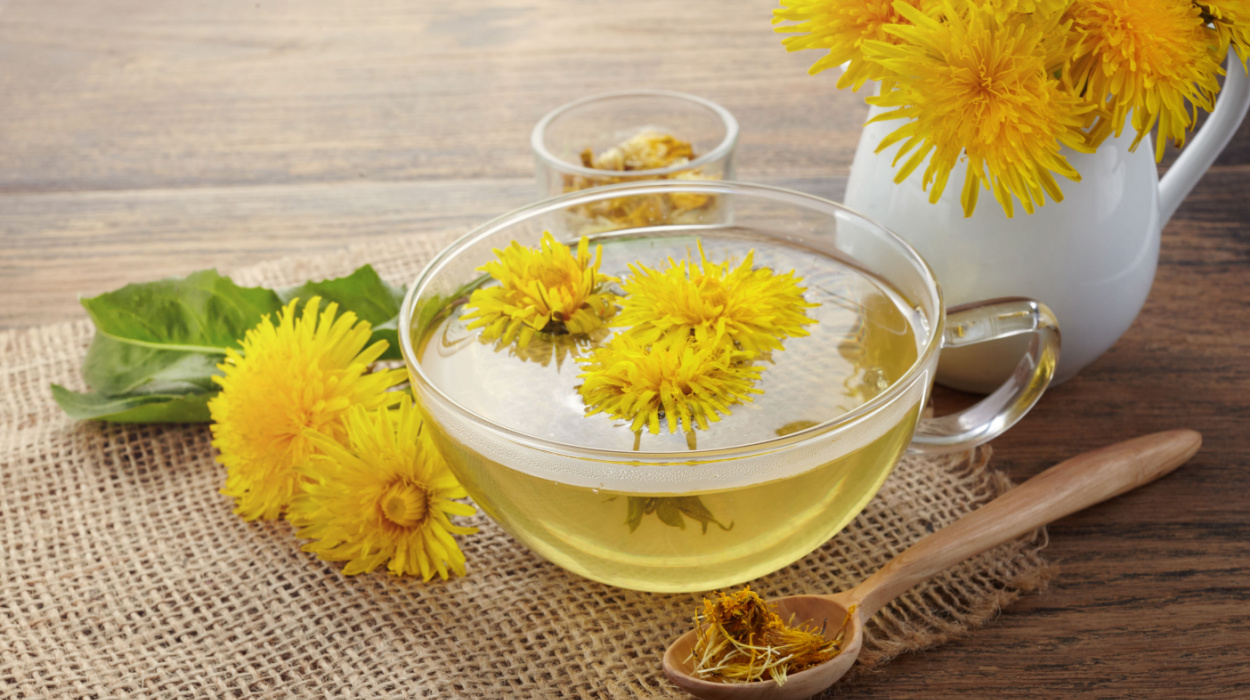When we think of dandelions, we may think of that pesky weed that grows on our lawns. However, dandelion extract has powerful medicinal[1] properties that have been used for centuries in ancient cultures, and now modern medicine has caught onto the benefits of dandelion, too. All parts of the dandelion plants including the dandelion flowers, dandelion leaves, and the dandelion roots can be used to make tea, which when drunk in adequate amounts, can help support the body in a number of ways.
Potential Health Benefits Of Dandelion Tea
- Reduce Water Weight
- Boost Metabolism
- Better Than Coffee
- Help With Constipation
- Boosts Liver Health
- Acts as a Prebiotic
- Boosta Skin Health
- Prevents UTIs
- Filled with Antioxidants
Dandelion Tea Benefits
Reduce Water Weight
Sometimes the body holds onto excess water, creating a feeling of bloating and a few additional pounds. Dandelion tea has a diuretic effect, helping the body produce more urine and increasing the urgency to release it. If you’re in need of a little relief and want to relieve the pressure, try a cup or two of dandelion tea. It should help get things moving.
Boost Metabolism
Dandelion tea contains flavonoids[2] which can help dissolve fat deposits and improve liver function. As a result, the liver can remove toxins and can burn fat for fuel better. Research has indicated that those who drink dandelion tea lose weight faster than people who don’t.
Better Than Coffee
When dandelion root is roasted before preparing, it tastes similar to coffee. Additionally, after it is seeped, the tea becomes a dark brown color, almost identical looking to coffee. Between the look and taste, roasted dandelion root tea gives coffee a run for its money. The major difference is, that the tea contains powerful medicinal properties, such as prebiotics and vitamins that coffee does not. Additionally, dandelion root tea is an herbal tea, containing no caffeine. For those looking to cut back on coffee and reduce stimulants, dandelion tea offers an easy and tasty replacement.
Help With Constipation
Dandelion tea provides at least two nutrients that can help relieve constipation: prebiotics and fiber. The fiber in the tea is great for digestion, in general, and the health of the GI system. Without adequate fiber, things can’t move through and out of the body as regularly as they should (at least once a day). Dandelion tea helps to draw fluid from the intestines and add it to the stool to bulk it up, making it easier to eliminate. The prebiotics serve as food for probiotics, the beneficial bacteria in your gut, which is another necessary component of good GI health and smooth movements.
Boost Liver Health
Dandelion tea contains polysaccharides, and multiple sugar molecules, which support the liver.[3] One way it does this is by helping the liver produce bile, a necessary substance needed to break down fats. Dandelion may also work to help the liver sort through and filter out toxins from other things we ingest (food, alcohol, medications). This is why dandelion greens are commonly prescribed to boost liver health, but you may also reap the same benefits from drinking dandelion tea.
Act As A Prebiotic
Probiotics are all the rage, however, we cannot talk about probiotics without mentioning prebiotics[4] (the fibers that feed probiotics). Probiotics alone are like having seeds in your garden without water. Prebiotics are the water that helps the seeds grow. Dandelion root is a prebiotic food (others include Jerusalem artichoke, garlic, onions, and unripe bananas), which means each time you eat them, you’re helping the beneficial bacteria in your gut (gut microbiome) thrive. Just make sure you’re also eating probiotics so the prebiotics have something to feed – probiotics will come from fermented foods like sauerkraut, kimchi, miso, yogurt, and tempeh.
Boost Skin Health

Dandelions contain sap inside their stems, just like trees. The white sap from dandelions is highly alkaline and ideal for treating itching, and irritated skin related to eczema, among other skin[5] conditions. It’s also been demonstrated that dandelion extracts from the leaf and flower can protect the skin from harmful UVB sun damage.
Prevent UTIs
Dandelion[6] tea is not only great for the gastrointestinal tract, but the urinary tract as well. If you’re prone to UTIs (Urinary Tract Infections) or just worried about them, drinking dandelion tea can help reduce your risk of getting them. As a diuretic, dandelion tea helps flush out the bladder, kidneys, and other reproductive organs. In particular, dandelion tea can help increase urine flow as well as fight off infections that can occur in the urinary tract.
Filled With Antioxidants
If you haven’t heard, antioxidants[7] are the power players of health. They come in abundance in whole fruits and vegetables, as well as coffee and certain teas. Dandelion tea is particularly high in antioxidants, the defendants and fighters against free radicals that damage our cells, which could lead to disease. In other words, for each stressor, our body takes on, whether too much sugar or air pollution, our cells get damaged, so we need antioxidants to keep us young and healthy. Enjoy two to three cups a day for the most antioxidant benefits.
What Is Dandelion Tea?
Dandelion tea comes from the dandelion plant, a plant that grows in North America, and requires very little sunlight. This makes it an easy plant to grow and maintain. Dandelions grow in many meadows and gardens and are often seen as weeds to be discarded, however, they hold powerful medicinal properties which make them worth hanging onto to make tea. Dandelion tea involves steeping the stems of the flower in boiling water, then straining out the roots and flower (although some people enjoy eating the roots and flower, too!). You may prefer roasting the dandelion root before making the tea – this creates a coffee-like flavor which can be helpful for those who are looking for an herbal tea replacement for coffee.
Dandelion Tea Nutritional Profile
One cup of raw dandelion contains 25 calories, 5 grams of carbohydrates, and 2 grams of fiber. The other macronutrients are nominal, including 1.5 grams of protein, less than a gram of fat, and almost no sugar. However, dandelion tea is a great source of beta-carotene, magnesium, iron, calcium, prebiotics, and zinc, and is loaded with antioxidants that help combat disease and premature aging.
Tips For Drinking Dandelion Tea

Dandelion tea is best enjoyed hot. Pour hot water over the tea leaves (or tea bad) in a cup and let steep for 10-15 minutes, then enjoy. For a more bland taste, try regular dandelion tea; for an earthier, roasted, coffee-like taste, try roasted dandelion tea. You may even wish to add a little milk and cinnamon.
Roasted dandelion tea can be bought in tea bags at most health food stores, or if you’re making the tea yourself, you may wish to roast the stems yourself before steeping.
While dandelion tea is generally considered safe, it may have adverse reactions in people with allergies to similar flowers, such as ragweed, chrysanthemums, marigolds, chamomile, yarrow, and daisies.
Dandelion tea may also have contraindications with certain conditions and medications. For example, dandelion tea may increase stomach acid, triggering heartburn. It may also flush medications out of the body faster since it operates as a diuretic. Those with problems with their kidneys, liver, and gallbladders should ask their medical provider before drinking dandelion tea.
Pregnant women should stick with one cup per day, but otherwise, healthy individuals can enjoy up to three cups per day.
Conclusion
Dandelion tea comes from the dandelion plant–a plant that would otherwise be discarded as a weed, but actually offers a variety of health benefits. Among them is liver health, which in turn has positive effects on detoxification, gut health, weight loss, and energy. Dandelion tea is easily purchased from any health food store and comes in regular and roasted options (roasted has a tastier, coffee-like flavor). Your practitioner may recommend dandelion tea for several ailments, but you may find it enjoyable to add to your routine for pleasure, as well.
Frequently Asked Questions
As with any food, drinking dandelion tea alone is not enough on its own, but does provide support to the liver, detoxification pathways, and the body’s metabolism, which can aid in weight loss.
This depends on your unique health condition and what benefits you’re trying to achieve. Generally speaking, the liver loves dandelion, so having it in either greens or tea form would be equally beneficial.
Tea is not well regulated in the United States, so many brands contain microplastics from the packaging, mold from sitting in storage rooms, and impure ingredients. It’s best to go with a brand like Traditional Medicinals or Yogi which have high standards of manufacturing and guarantee that the tea is organic.
Two to three cups of dandelion tea is safe to drink every day unless you have a specific medical condition that dictates otherwise. Pregnant women should drink a little less (only one cup per day), but this, too, should be discussed with your healthcare provider.
 Expert's opinion
Expert's opinion
